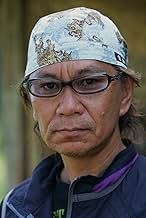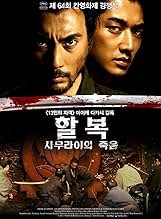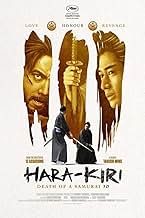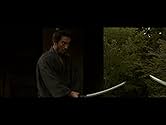VALUTAZIONE IMDb
7,3/10
9766
LA TUA VALUTAZIONE
Una storia di vendetta, onore e disgrazia, incentrata su un samurai povero che scopre il destino di suo genero Ronin, mettendo in moto una dura prova di vendetta contro la casa di un signore... Leggi tuttoUna storia di vendetta, onore e disgrazia, incentrata su un samurai povero che scopre il destino di suo genero Ronin, mettendo in moto una dura prova di vendetta contro la casa di un signore feudale.Una storia di vendetta, onore e disgrazia, incentrata su un samurai povero che scopre il destino di suo genero Ronin, mettendo in moto una dura prova di vendetta contro la casa di un signore feudale.
- Regia
- Sceneggiatura
- Star
- Premi
- 6 candidature totali
Eita Nagayama
- Motome Chijiiwa
- (as Eita)
Gorô Daimon
- Priest
- (as Goro Daimon)
Recensioni in evidenza
Takashi Miike's second straight tribute to the samurai genre is a well-crafted and finely honed object. It's more consistent than Miike's previous samurai film, 13 Assassins, although that also means it lacks anything as great as that film's final battle. But what sets Hara-Kiri apart is its willingness to not just offer a pastiche of these films but genuinely question their values in a way that is still challenging to the contemporary viewer.
Through a series of events told partially in flashbacks, Hara-Kiri poses the question of how relevant our values are -- whether they be highly codified values like honour or the more nebulous instincts that guide us today -- in the face of human suffering. The ronin that we see humiliated and killed in the first act is not guilty of breaking some arcane samurai bylaw but of doing something most of us would find disgraceful. But as the film goes on it argues that we should hold compassion even for people such as this, and that honour is ultimately irrelevant in the face of social suffering. In an age of recession and austerity, where so many try to cling to their ideas of what they or other people "deserve", this is an important message.
It's an easy film to appreciate and a difficult one to love -- there's a kind of coldness to this set of Miike's movies that seems out of place with the gonzo enthusiasm of his earlier work. And doubtlessly it will be too slow and cerebral for some. But its critique of not just a canonized genre but the way in which we view ethics makes it well worth seeing.
Through a series of events told partially in flashbacks, Hara-Kiri poses the question of how relevant our values are -- whether they be highly codified values like honour or the more nebulous instincts that guide us today -- in the face of human suffering. The ronin that we see humiliated and killed in the first act is not guilty of breaking some arcane samurai bylaw but of doing something most of us would find disgraceful. But as the film goes on it argues that we should hold compassion even for people such as this, and that honour is ultimately irrelevant in the face of social suffering. In an age of recession and austerity, where so many try to cling to their ideas of what they or other people "deserve", this is an important message.
It's an easy film to appreciate and a difficult one to love -- there's a kind of coldness to this set of Miike's movies that seems out of place with the gonzo enthusiasm of his earlier work. And doubtlessly it will be too slow and cerebral for some. But its critique of not just a canonized genre but the way in which we view ethics makes it well worth seeing.
I thought they did a wonderful job with this movie. They didn't sell out by making it all in English with American actors. They didn't go crazy making it a bloodbath just to get the younger viewers. The movie really gives you an insight into Japan's history and what life was like for these people. The atmosphere and story telling really draws you in. The acting is great especially one scene that had me cringing. There were a lot of parts where I was like whoa I didn't see that coming. I can understand those out there loyal to the original but you at least have to give the film makers of this remake credit. They stayed true to Japanese culture, they didn't get tom cruise or Keanu reeves to star in it. They didn't write it for the newer younger audience and make all the characters smart mouth kids. Unfortunately I haven't seen the original yet and I understand how those people might not like this one. I don't know how I would feel about a seven samurai remake? I think this movie was well done. It succeeded in telling a truly gripping story without going all modern on it and ruining it. I enjoyed it.
It would've taken guts to remake one of the most acclaimed Japanese films of all time (1962's Harakiri), but then again, no one could accuse Takashi Miike of being a gutless filmmaker. I was curious to see this because some of Miike's best films are remakes or updates of stories that have already been adapted to film (like 13 Assassins and Graveyard of Honour).
This remake really follows the original perhaps a little too closely. I think it's just a few minutes shorter, and I can really only think of one scene that was in the original that wasn't in this. Visually, it replicates Masaki Kobayashi's style really well, but maybe part of me was hoping that Takashi Miike would do something a little more out-there or unexpected. Instead, he chose to be reverent to the original, but then again, it is a classic film that deserves reverence.
There's one infamous scene from the original that feels even harder to watch here, and I think the climax shakes things up a little too, to mixed effect (the final fight is fairly different). Otherwise, the story and all the characters are near-identical, and anyone familiar with the 1962 version is unlikely to find too many surprises here.
It's strange to try and review this, because it is a high-quality film... yet it's based on a high-quality classic that still holds up extremely well, so I'm not entirely sure what the rationale was behind this. For those who want to see a more modern-looking version of Harakiri in colour instead of black and white, this is very well-made and watchable, but I feel like the original is still more worthy of being watched first, for anyone unfamiliar with either film.
This remake really follows the original perhaps a little too closely. I think it's just a few minutes shorter, and I can really only think of one scene that was in the original that wasn't in this. Visually, it replicates Masaki Kobayashi's style really well, but maybe part of me was hoping that Takashi Miike would do something a little more out-there or unexpected. Instead, he chose to be reverent to the original, but then again, it is a classic film that deserves reverence.
There's one infamous scene from the original that feels even harder to watch here, and I think the climax shakes things up a little too, to mixed effect (the final fight is fairly different). Otherwise, the story and all the characters are near-identical, and anyone familiar with the 1962 version is unlikely to find too many surprises here.
It's strange to try and review this, because it is a high-quality film... yet it's based on a high-quality classic that still holds up extremely well, so I'm not entirely sure what the rationale was behind this. For those who want to see a more modern-looking version of Harakiri in colour instead of black and white, this is very well-made and watchable, but I feel like the original is still more worthy of being watched first, for anyone unfamiliar with either film.
It's a good film. I didn't see the original and so I wasn't tainted by how they compare, or the book either. It probably made this film a little hard to understand because the chronology jumps around and there are a lot of flashbacks - but I stuck with it and it did begin to make sense. The movie is a basically a tragedy that also dissects the samurai code and provides some thought provoking material to consider. The movie is reasonably well paced and for a Japanophile the set design and costumes are very well done. I don't know if Japan was that squeaky clean and tidy 400 years ago, but it seemed well considered and accurate. The movie was a little slow but portrayed a sort of Zen tranquility, so it worked for the mood or atmosphere. You could pick apart this movie, and it may not stand up to the original but if you're a fan of Japanese cinema it's definitely worth seeing.
Takashi returns to the samurai world after the success of '13 assassins' in 2011. This movie was a remake of 1962 'Harakiri' which was also a massive hit movie. I have not seen the original but this movie blown me away. As usual the story opens slow and hard to identify the situation of the story but at the right middle of the movie the flashback strikes with awesome drama about poverty and family sentiment. Once the flashback was told you will easily say where the movie is heading. The story was classic and the movie was presented with rich cinematography. The first digital 3D movie for Takashi Miike as well the first 3D movie to premier at 2011 Cannes film festival.
You have to learn a word to understand the movie completely. 'Seppuku' - which means ritual suicide committed by a samurai. So that is why it's called 'Hara-kiri: death of a samurai'. You must have patience during opening sequences, without character and story development you will be in a tough position to understand about what's going on. While the story and character progress with the development you will start to get and you may fall for the emotion parts if you are a tenderhearted. And also you will be uncomfortable during 'seppuku' scene.
Takashi Miike's career best, this is what already everyone saying about it. But Its to hard to say which was his best, I like many of his works. I might be overwhelmed by the watch but will be happy to recommend it to others. I was very little unhappy for the ending scene otherwise I could have said it is the best of Takashi's work.
I am so curious about Takashi Miike's upcoming and Hollywood debutante project 'The outside' with Tom Hardy. Expecting it would be another 'The last samurai', I wish a good luck to the team.
You have to learn a word to understand the movie completely. 'Seppuku' - which means ritual suicide committed by a samurai. So that is why it's called 'Hara-kiri: death of a samurai'. You must have patience during opening sequences, without character and story development you will be in a tough position to understand about what's going on. While the story and character progress with the development you will start to get and you may fall for the emotion parts if you are a tenderhearted. And also you will be uncomfortable during 'seppuku' scene.
Takashi Miike's career best, this is what already everyone saying about it. But Its to hard to say which was his best, I like many of his works. I might be overwhelmed by the watch but will be happy to recommend it to others. I was very little unhappy for the ending scene otherwise I could have said it is the best of Takashi's work.
I am so curious about Takashi Miike's upcoming and Hollywood debutante project 'The outside' with Tom Hardy. Expecting it would be another 'The last samurai', I wish a good luck to the team.
Lo sapevi?
- QuizThe first 3D title ever to be shown in official selection at the Cannes Film Festival.
- BlooperAs the wooden wakizashi is pushed into the stomach (after the tip snapped off), you can see that the blade is sliding into the handle.
- Citazioni
Hanshirô Tsugumo: A warrior's honor is not something simply worn for show!
- ConnessioniFeatured in At the Movies: Cannes Film Festival 2011 (2011)
I più visti
Accedi per valutare e creare un elenco di titoli salvati per ottenere consigli personalizzati
- How long is Hara-Kiri: Death of a Samurai?Powered by Alexa
Dettagli
- Data di uscita
- Paesi di origine
- Siti ufficiali
- Lingua
- Celebre anche come
- Cái Chết Của Võ Sĩ Đạo
- Aziende produttrici
- Vedi altri crediti dell’azienda su IMDbPro
Botteghino
- Lordo Stati Uniti e Canada
- 75.688 USD
- Fine settimana di apertura Stati Uniti e Canada
- 10.920 USD
- 22 lug 2012
- Lordo in tutto il mondo
- 5.435.358 USD
- Tempo di esecuzione2 ore 8 minuti
- Colore
- Mix di suoni
- Proporzioni
- 2.35 : 1
Contribuisci a questa pagina
Suggerisci una modifica o aggiungi i contenuti mancanti

Divario superiore
By what name was Hara-Kiri: Death of a Samurai (2011) officially released in Canada in French?
Rispondi






























